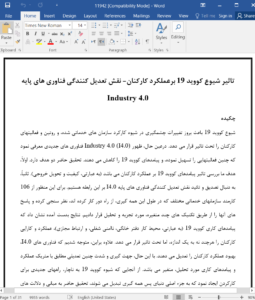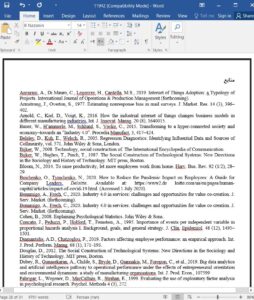Abstract
COVID-19 outbreak has implied significant changes in the way service organizations work, affecting employees' routine and activities. At the same time, the advent of Industry 4.0 (I4.0) introduced new technologies that might facilitate such activities, mitigating the COVID-19's implications. The objective of this research is two-fold. First, we aim at examining the impact of COVID-19's work implications on employees' performance (i.e. output quality and delivery). Second, we seek to verify the moderating role of I4.0 base technologies on this relationship. We surveyed 106 employees of different service organizations who have been working remotely during the pandemic and analyzed their responses through multivariate techniques. Results revealed that COVID-19's work implications (i.e. home office work environment, job insecurity and virtual connection) do impact employee's performance, although not at the same extent. Further, we found that I4.0 technologies moderate the enhancement of employee's performance. However, the orientation and intensity of such moderation may vary according to the performance metric and work implication under analysis. As COVID-19 outbreak inevitably pushed new ways of working that can become an integral part of the post-pandemic world, our research provides important theoretical and practical implications for improving employee's performance through the digitalization of service organizations.
1. Introduction
COVID-19 outbreak has pushed almost all the employees around the world to work in a completely different setting in comparison to what it used to be before. COVID-19 triggered interventions such as social distancing, travel restrictions, virtual or remote work, and skeleton crews have constrained the continuance of earlier processes, thereby changing the way employees work (Gallup, 2020; Tortorella et al., 2020a). Such interventions triggered by COVID-19 outbreak introduced employee behavioral changes, which can transition with multiple lockdowns from temporary to long-lasting. Line managers, team leaders and human resources professionals are very concerned about such behavioral changes as they can influence employees’ emotional, cognitive, and physical wellbeing, which can ultimately impact their deliverables and performance (Graves and Karabayeva, 2020).
5.2. Practice implications
Regarding practical contributions, our research raised arguments to managers of service organizations that are implementing I4.0 technologies and working remotely during the COVID-19 outbreak. Our findings indicate that service organizations might need to rethink their processes and routines for the post-pandemic period based on the lessons learned from the COVID-19’s work implications. For instance, the reinforcement of home office environment appears to be an interesting alternative to enhance performance of the employees of these organizations. Furthermore, our results indicate that organizations concurrently adopting I4.0 base technologies and virtual connection practices might improve employees’ performance, especially in terms of quality output. This insight is expected to add value to team leaders and line managers who face difficulty in containing the negative impact of COVID-19 pandemic on employee’s performance. Such indications might be valuable not only during the pandemic outbreak, but also be a legacy to the service industry context for the post-pandemic world.










